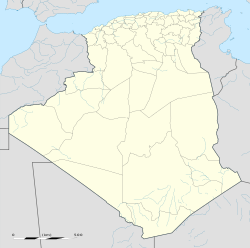Tagaste
|
Souk Ahras Suq Ahras / Tagast سوق أهراس /طاغاست |
|
|---|---|
| City and Commune | |
| City of Souk Ahras | |

Former city hall of Souk Ahras, now used as a municipal theatre
|
|
 |
|
| Location of Souk Ahras within Algeria | |
| Coordinates: 36°17′11″N 7°57′4″E / 36.28639°N 7.95111°ECoordinates: 36°17′11″N 7°57′4″E / 36.28639°N 7.95111°E | |
| Country |
|
| Province | Souk Ahras (seat) |
| District | Souk Ahras (coextensive) |
| Government | |
| • PMA Seats | 33 |
| Area | |
| • Total | 812 km2 (314 sq mi) |
| Elevation | 699 m (2,293 ft) |
| Population (2011) | |
| • Total | 156,745 |
| • Density | 190/km2 (500/sq mi) |
| Time zone | CET (UTC+01) |
| Postal code | 41000 |
| Area code(s) | +213 (37) |
| ONS code | 4101 |
| Website | www.soukahrastourisme.com |
Souk Ahras (Berber: Suq Ahras or Tagast; ancient name: Thagast; Arabic: سوق أهراس) is a municipality in Algeria. It is the capital of Souk Ahras Province. The Numidian city of Thagaste (or Tagaste), on whose ruins Souk Ahras was built, was the birthplace of Augustine of Hippo and a center of Berber culture. It was a city of great culture, described as the very hub of civilization.
The name derives from the Arabic word "souk" which means market, and the Chaoui Berber word ahra (plural ahras) which means lion, in reference to the Barbary lions which existed in the neighboring forests until their extinction in 1930; hence Souk Ahras means market of lions (see also Oran (Wahran) and Tahert for names with a related etymology).
The old name of the Numidian city of Thagaste, derives from the Berber Thagoust, which means the bag, given that the site of the town is located at the foot of a mountain surrounded by three peaks in the form of a bag containing the city. Subsequently, when the Arabic language entered in the region it was called Soukara. In other sources it is cited as the Palace of the African, according to Al-Masudi.
The town of Souk Ahras, as its region, experienced Aterian culture from the end of the Middle Palaeolithic to the early upper Palaeolithic Ages. After the Aterian, Souk Ahras was inhabited by people of the Capsian culture. Many stone tools dating to this period have been discovered. Stemmed arrows were found on the site of present-day Souk Ahras, but also in Tiffech and Taoura, not far from it.
...
Wikipedia

